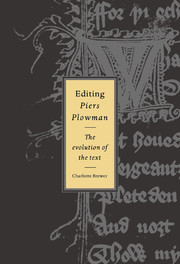Book contents
- Frontmatter
- Contents
- Acknowledgements
- Abbreviations
- Note on the texts
- Introduction
- Part I The early phase
- Part II The late nineteenth century
- 5 The Early English Text Society and its editorial context
- 6 Skeat: introduction
- 7 Skeat's A-Text
- 8 Skeat's B-Text
- 9 Skeat's C-Text
- Part III The Skeat aftermath
- Part IV Chambers and Grattan, Knott and Fowler
- Part V The Athlone Press edition
- Part VI Epilogue: the Athlone aftermath: Schmidt, Pearsall, Rigg-Brewer, et al.
- Works cited
- General index
- Index of manuscripts
- CAMBRIDGE STUDIES IN MEDIEVAL LITERATURE
5 - The Early English Text Society and its editorial context
Published online by Cambridge University Press: 20 August 2009
- Frontmatter
- Contents
- Acknowledgements
- Abbreviations
- Note on the texts
- Introduction
- Part I The early phase
- Part II The late nineteenth century
- 5 The Early English Text Society and its editorial context
- 6 Skeat: introduction
- 7 Skeat's A-Text
- 8 Skeat's B-Text
- 9 Skeat's C-Text
- Part III The Skeat aftermath
- Part IV Chambers and Grattan, Knott and Fowler
- Part V The Athlone Press edition
- Part VI Epilogue: the Athlone aftermath: Schmidt, Pearsall, Rigg-Brewer, et al.
- Works cited
- General index
- Index of manuscripts
- CAMBRIDGE STUDIES IN MEDIEVAL LITERATURE
Summary
THE NEW PHILOLOGY
Thomas Wright's edition of Piers Plowman fell considerably short of the promise it appeared to offer. By the mid nineteenth century, as indicated by the criticism directed by Richard Garnett at Wright's earlier efforts, expectations of editing standards had in some respects risen. But they seem rarely to have been met. Sir Frederick Madden's editions of the Gawain poems and Lazamon's Brut stand out as exceptions. Both Madden and Garnett were well aware of contemporary developments in European, particularly German scholarship, which gave them a head start over many of their fellow philologists. It is worth taking some time to survey the state of editing theory and practice in England during this period, in particular the work of the Early English Text Society, so as to set the achievement of the next editor of Piers Plowman, W. W. Skeat, in its proper context.
English scholarship throughout the nineteenth century lagged far behind German, in a wide range of disciplines but particularly in Germanic Philology and in Old English and classical studies. According to A. E. Housman, the period after 1825 was the time when ‘our own great period of scholarship, begun in 1691 by Bentley's Epistola ad Millium, had ended’, and English classical scholars, ‘having turned their backs on Europe and science and the past, sat down to banquet on mutual approbation, to produce the Classical Museum and the Bibliotheca Classica, and to perish without a name’.
- Type
- Chapter
- Information
- Editing Piers PlowmanThe Evolution of the Text, pp. 65 - 90Publisher: Cambridge University PressPrint publication year: 1996

